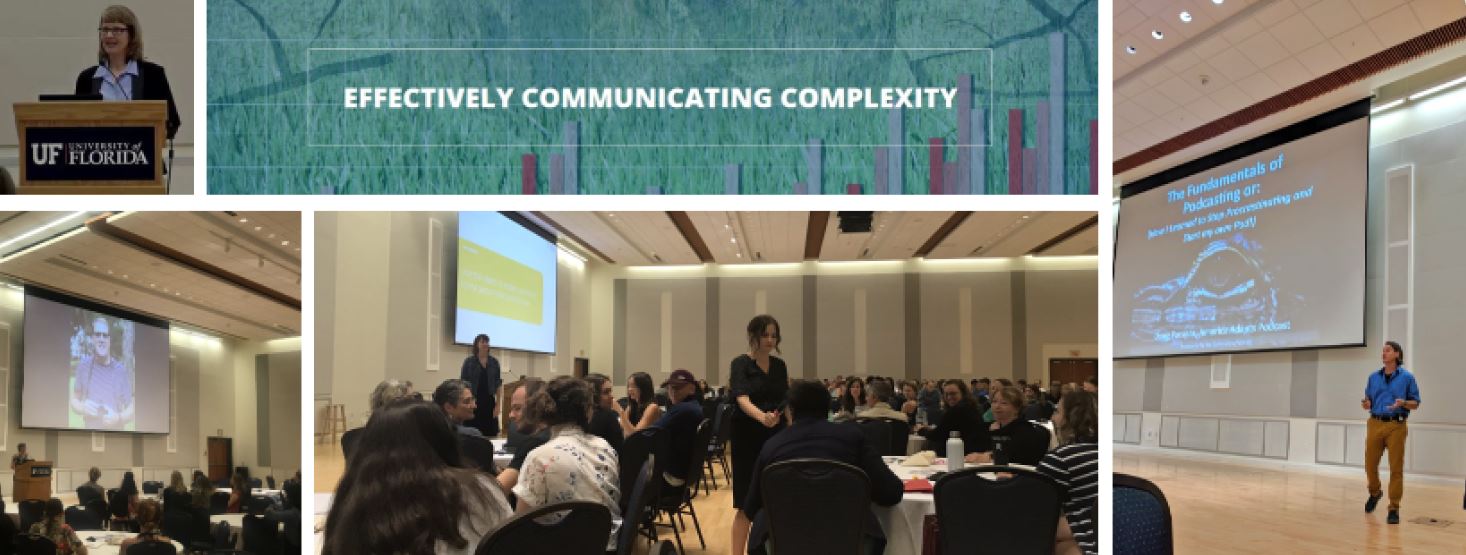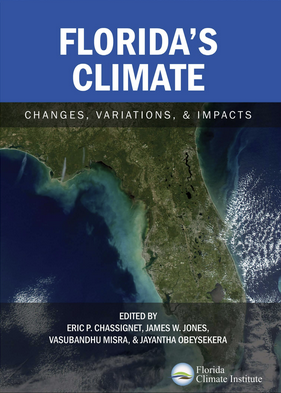 |
 |
Two-thirds of Floridians Concerned About Climate Change and Don't Feel Government is Doing Enough to Address Impacts
(
Source: FAU CES) FAU's Center for Environmental Studies (CES) and the Business and Economics Polling Initiative (BEPI) recently collaborated on the first-ever Florida Climate Resilience Survey. The main purpose of the survey is to gauge Floridians' views on their preparedness and resilience to climate hazards.
"Since the early 1990s, the climate change question at the national-level has become increasingly polarized along party lines," said Colin Polsky, Ph.D., director of the FAU Center for Environmental Studies and lead author of the study. "Yet in recent years a growing number of states and cities have taken meaningful actions to recognize, study, and address climate change. These actions are largely consolidated in blue-leaning states, unlike Florida, and the national-level discourse remains polarized along partisan lines."
One take-away from the study is that a large majority of Floridians favor teaching about climate change causes, consequences, and solutions in Florida K-12 classrooms (68%). Read more about the study results by visiting the
CES-BEPI website.
|
Videos from 5th Annual Climate Communication Summit Now Available
The 5th Annual Climate Communications Summit, held Oct. 29th in Gainesville, included workshops on effective communication strategies and on podcasting. Below are links to videos from the event.
|
Rebuild Florida's Mitigation Program Offers New Disaster Funding
The U.S. Department of Housing and Urban Development (HUD) has announced that $633 million in first-of-its-kind funding will be available to the state of Florida for disaster mitigation projects in areas impacted by declared disasters in 2016 and 2017. These funds are available through HUD's newly created Community Development Block Grant - Mitigation (CDBG-MIT) program and will be used to fund disaster mitigation projects to better protect Florida from future disasters.
The Florida Department of Economic Opportunity (DEO), along with other state agencies and local communities, will develop and submit the State Action Plan to HUD for review by February 3, 2020. Upon approval of the plan, DEO will work with statewide partners to distribute the federal funds to help better protect Florida's communities from future disasters.
As part of the development of the State Action Plan, DEO will host a series of regional public workshops across Florida to seek feedback and input for the use of CDBG-MIT funds. Times and locations can be found at
http://www.floridajobs.org/rebuildflorida/mitigation.
|
New study analyzes FEMA-funded home buyout program
UM-led study provides insights to revise federally funded managed retreat program
MIAMI-An analysis of FEMA's 30-year-old property buyout program offers new insight into the growing debate on managed retreat-moving people and assets out of flood-prone areas. A research team led by scientists at the University of Miami (UM) Rosenstiel School of Marine and Atmospheric Science found that FEMA-funded voluntary buyouts of flood-prone properties have been more likely to take place in counties with higher population and income. However, the buyouts themselves were concentrated in neighborhoods with lower income and greater social vulnerability. The researchers hope their analysis can provide insights to help revise this program in the future.
Learn more.
|
Strategies to Address Climate Change Risk in Low- and
Moderate-income Communities
The most recent issue of the
Community Development Innovation Review offers strategies that address climate change risk in low- and moderate-income (LMI) communities. As these communities begin to grapple with a changing environment, strategic investments can increase resiliency and support adaptation while simultaneously advancing community development priorities. The articles in this issue of the Review consider these investment opportunities from a diverse set of community, financial, economic, and academic perspectives. The Review is published by the Federal Reserve Bank of San Francisco.
|
|
Proposed Florida Climate Assessment
The proposed Florida Climate Assessment will:
- Produce a strategic tool with standards, data, analyses, andthresholds for use in planning, decision-making, setting research agendas, and use in public policy and legislation
- Ensure resiliency decisions are informed by the best available science through an iterative, stakeholder driven process that is easily updated and user-focused
- Use the best science in a manner that is responsive, supportive, and critical focusing on systems and not separate sectors
- Improve relationships between knowledge producers and users and yield better decisions and outcomes to build capacity and overcome barriers
We want to know your thoughts on the proposed Florida Climate Assessment and its potential value to your work and to the state of Florida.
Email us and please include your name, contact information, affiliation, and position.
|
|
Awards and Achievements
Dr. Chris Beehner, Seminole State College of Florida
, has completed his second sustainability-themed book entitled System Leadership for Sustainability (ISBN 9780367342180), which will be released by Routledge in December 2019. This book is the first to explore the application of system leadership to promote sustainable solutions for contemporary and future environmental and social problems.
|
|
Upcoming Events & Webinars
|
Miami Climate Symposium 2020
The University of Miami's
Miami Climate Symposium 2020: Predicting and Living with Extremes will present the state of the science for understanding climate dynamics and extreme events - and managing the associated risks. The interdisciplinary symposium, scheduled for January 22-24, 2020, will focus on the cutting-edge research for predicting extreme events within a changing climate, from the local to international scale. Experts from UM's Rosenstiel School of Marine & Atmospheric Science will convene and lead other scientific thought leaders, and local stakeholders to:
- Explore how hurricanes, storm surge, and coastal flooding are exacerbated by long-term climate issues (sea-level rise, salt water intrusion, harmful algal blooms, and extreme heat waves)
- Discuss adaptation policies and strategies
- Assess responses to extreme events at the local level
Throughout the event, a team of "translators" - comprised of journalists with a proven understanding of reporting climate science - will synthesize the presentations and discussions. They will present their findings during the symposium's capstone closing session, which will be open to the public and the press, and will include a panel discussion with scientists, stakeholders and decision makers.
For more information.
|
|
Job, Internship, and Fellowship Opportunities
|
|
Publications
Cazenave, A., Hamlington, B., Horwath, M., Barletta, V. R., Benveniste, J., Chambers, D., et al. (2019).
Observational Requirements for Long-Term Monitoring of the Global Mean Sea Level and Its Components Over the Altimetry Era.
Front. Mar. Sci., 6
Charles, S. P., Kominoski, J. S., Troxler, T. G., Gaiser, E. E., Servais, S., Wilson, B. J., et al. (2019).
Experimental Saltwater Intrusion Drives Rapid Soil Elevation and Carbon Loss in Freshwater and Brackish Everglades Marshes.
Estuaries and Coasts, 42(7), 1868-1881.
Mach, K. J., Mach KJ, Kraan, C. M., Kraan CM, Hino, M., Hino M, et al. (2019).
Managed retreat through voluntary buyouts of flood-prone properties.
Sci Adv, 5(10), eaax8995.
Monroe, M. C., Plate, R. R., Oxarart, A., Bowers, A., & Chaves, W. A. (2019).
Identifying effective climate change education strategies: a systematic review of the research.
Environmental Education Research, 25(6), 791-812.
Shealy, T., Klotz, L., Godwin, A., Hazari, Z., Potvin, G., Barclay, N., et al. (2019).
High school experiences and climate change beliefs of first year college students in the United States.
Environmental Education Research, 25(6), 925-935.
|
A Book from the FCI:
Florida's Climate: Changes, Variations, & Impacts
Florida's Climate: Changes, Variations, & Impacts provides a thorough review of the current state of research on Florida's climate, including physical climate benchmarks; climate prediction, projection, and attribution; and the impacts of climate and climate change on the people and natural resources in the state. The book is available for purchase in paperback and Kindle format at
Amazon.com.
Individual chapters may be accessed on the
FCI website.
|
|
About Us
The Florida Climate Institute (FCI) is a multi-disciplinary network of national and international research and public organizations, scientists, and individuals concerned with achieving a better understanding of climate variability and change.
Email: info@floridaclimateinstitute.org Website: floridaclimateinstitute.org
|
|
|
|
|
 |
















